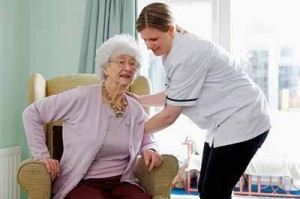New research shows that the field is growing larger when it comes to those that are providing in-home care on a professional basis. This shouldn’t be a surprise to anyone. For several years now there has been much concern in the senior care industry because of the fact that so much growth was going to be needed. It wasn’t a matter of whether or not the in-home care sector within the larger senior care business would grow, but whether or not it would grow fast enough.
If you look at pure numbers, there are more senior citizens than ever before thanks to increases in life expectancy, and more of these seniors are receiving in-home care than ever before, too. In a study from 2012, more than half of disabled seniors were receiving in-home care. That’s 20 percent higher than the numbers from the 1990s indicated. So, not only are there more senior citizens in the United States, a higher percentage of them are receiving in-home care than ever before. The need for in-home care is growing faster than the senior population itself is. This has placed quite a bit of demand on existing caregivers, and it has opened up the door for those that want to enter this line of work.
Along with this concern comes something that most people haven’t paid much thought to. In addition to the issue of whether or not the in-home care business would and could grow quickly enough, people need to be concerned with whether or not enough quality caregivers would be added to the job pool. The same study that looked at the growth of the in-home care profession took a look at this and found that not all groups of seniors were getting the appropriate levels of care. Much of the time this was because of family caregivers. Seniors with minor disabilities were those that had the largest increase in the numbers that were receiving care from someone else, which shows that staying in the home for as long as possible is important to most.
It also needs to be pointed out that not everyone that needs care is receiving it. About two-thirds of elderly men have no caregiving help at all. With females, that number drops by about 20 percent. These numbers are severely low, especially considering the fact that statistics say about 50 percent of older men currently need some sort of senior care. So while the industry has grown, it still isn’t growing fast enough. If you have an elderly loved one, it’s important that you help them in some way if they need care. It can be a professional caregiver, or it can be a family one.
Being a family caregiver is not easy. You might know your parent better than anyone else, but you might be lacking in the know-how that is needed to be an excellent caregiver. This is where professional care becomes so important, and it’s why finding loving, compassionate care is a must. What they lack in the relationship that you have with your mom or dad, professional caregivers make up for by their ability to administer a better quality of life to the people that they help.



Leave a Reply